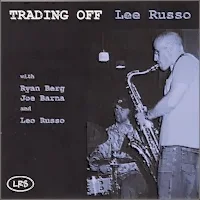Time: 48:25
Size: 110.8 MB
Styles: Hard bop, Saxophone jazz
Year: 2006
Art: Front
[5:16] 1. Blues For Judith
[2:45] 2. Diatonic
[5:54] 3. Goldfinch
[5:46] 4. Kin
[8:05] 5. O's Waltz
[5:33] 6. Nat And Em
[4:57] 7. Ivory Romance
[5:32] 8. You're It
[4:32] 9. Trading Off
No keyboards. No guitars. No other horns except for a guest artist in the middle of the disc. In short, no other “lead” instruments to fall back on. For most players, this would be like juggling torches while walking the high wire. Lee Russo wanted it this way for Trading Off, his first CD. Maybe he's an insane risk-taker. Or maybe he's got the goods.
The disc should look Old School, because Russo's got an Old School tone, both in his playing and writing styles. In the liner notes, Lee says his influences are too numerous to mention. The opening track, “Blues For Judith”, reveals two influences right off, as Russo hits you with a West Coast mood and a mellow tenor sax that took me back to the first time I heard Paul Desmond. I will love Dave Brubeck until I die, but it was Desmond's singular sax work - mellow like Getz, but with an underlying edge as sharp as a knife - that elevated the Brubeck Quartet above everything else on the scene. Russo's playing has Desmond's edge while his writing has West Coast's sense of subtlety.
Don't worry about your cholesterol, because Russo's not re-frying anything. He's learned his lessons well, but all these pictures come straight from Lee's easel. “Diatonic” is a frantic abstract painted one slash and splash at a time, while “You're It” is a happy, playful travelogue that lets Russo take off on soprano sax. It was a good choice for Russo to do a couple of numbers on soprano; given the small size of his group, some kind of tonal variation was needed to break up the overall attack. Trading Off wouldn't be boring if Lee only played tenor, but why take the chance?
The disc should look Old School, because Russo's got an Old School tone, both in his playing and writing styles. In the liner notes, Lee says his influences are too numerous to mention. The opening track, “Blues For Judith”, reveals two influences right off, as Russo hits you with a West Coast mood and a mellow tenor sax that took me back to the first time I heard Paul Desmond. I will love Dave Brubeck until I die, but it was Desmond's singular sax work - mellow like Getz, but with an underlying edge as sharp as a knife - that elevated the Brubeck Quartet above everything else on the scene. Russo's playing has Desmond's edge while his writing has West Coast's sense of subtlety.
Don't worry about your cholesterol, because Russo's not re-frying anything. He's learned his lessons well, but all these pictures come straight from Lee's easel. “Diatonic” is a frantic abstract painted one slash and splash at a time, while “You're It” is a happy, playful travelogue that lets Russo take off on soprano sax. It was a good choice for Russo to do a couple of numbers on soprano; given the small size of his group, some kind of tonal variation was needed to break up the overall attack. Trading Off wouldn't be boring if Lee only played tenor, but why take the chance?
Trading Off





















